September 12, 2024
Organizations come together to talk about climate change at BTCC
By Dorothy Castro
How we care for the Earth determines the future of our communities. Tzu Chi Foundation, Brahma Kumaris, and the University of the Philippines National Institutes of Health collaborated on September 11 in a talk about health and the environment at the Jing Si Hall of Buddhist Tzu Chi Campus (BTCC) Sta. Mesa, Manila. Tzu Chi Philippines’ CEO Henry Yuñez welcomed the speakers, showing his appreciation for the organizations’ support for climate action.
The event titled “Journey towards a climate of healing and hope: An environment forum for a healthier planet," is part of Brahma Kumaris’ 40th anniversary activities. The partnership showcased the common advocacies shared by the spiritual movement founded in India and the Taiwan-based Buddhist organization: following a plant-based lifestyle, mindfulness, and saving our planet.
Three speakers touched on global threats to our planet in three contexts, and what we can do to help.
Dr. Esterlita Uy, institute director of the Institute of Child Health and Development at UP Institutes of National Health, discussed community health and climate change. She cited sudden onset impacts such as disasters and slow event impacts such as environmental degradation, rising sea levels, and effects on biodiversity.
Lineth Brondial, Tzu Chi program officer, detailed how our dietary consumption can help the planet heal. "Transitioning to a plant-based lifestyle has the potential to reduce land use. As of now, 30% of the world's greenhouse gasses are emitted by the food sector. Eighty percent of all agricultural land is used for livestock production, which is the greatest driver of deforestation and biodiversity loss globally," Brondial said.
Sr. Jayanti Kirpalani, co-chief of Brahma Kumaris World Spiritual University and the event’s key speaker, gave a fresh perspective on how our lifestyle affects the world around us. She imparted wisdom on consciousness, inner peace, and how it affects our planet.
“If consumerism and materialism continue, what would be their impact on our climate? We’re already using two and a half times the resources of our planet that we can have,” she said.
Dr. Uy suggests practicing healthy habits that, in turn, conserve resources. “If you think about it, it's living a healthy life. Walking more, using less plastic, using what you have on hand, eating fruits that are in season, decreasing our animal or dairy intake, [and] having a healthy lifestyle,” she enumerated.
Amelie Erivera saw how these lessons benefit the youth: “This will greatly help us as teachers to educate the next generation. If we look at it, they are affected [by this]. Inside the house, we should start teaching them to recycle and what we need to learn so that we can save our environment,” said the Filipino teacher at Bacood Elementary School. The school observes climate action, added Erivera. It practices rainwater harvesting, upcycling, and recycling.
Adopting a plant-based lifestyle is one of Tzu Chi’s eco-friendly initiatives. Tzu Chi also “invests in research and product development in Taiwan to turn PET bottles into fabric,” said Tzu Chi Deputy CEO Peggy Sy Jiang. Other projects include upcycling, recycling, and composting.
These actions, according to Brondial, are what we can do to create a bright future for our planet. An advocate for a plant-based diet, she believes we can start by adopting a plant-based lifestyle as an effective way to counter climate change impacts. “We can think of [this] as planting seeds. If we take care of it and water it daily, we can see its growth. It will follow the process of being a seed to a seedling, to a sapling, to a tree. That's where hope comes in,” said Brondial.
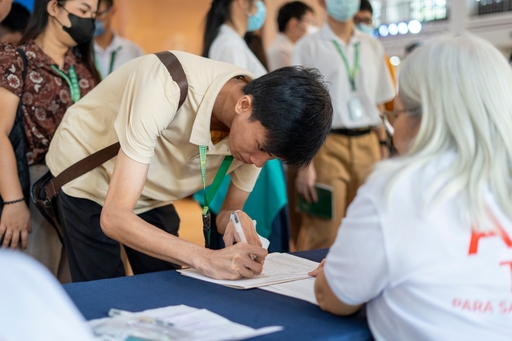 Attendees coming from various organizations, schools, and many interested audiences register as early as 9am to listen to the tripartite discussion on the environment.
Attendees coming from various organizations, schools, and many interested audiences register as early as 9am to listen to the tripartite discussion on the environment.
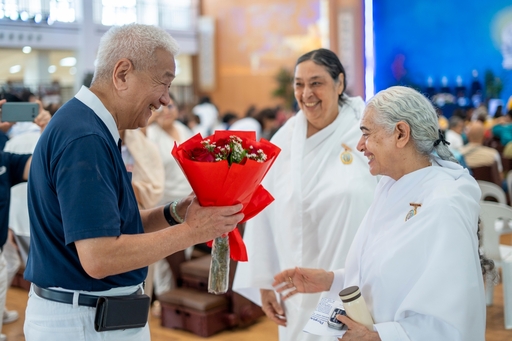 BK Sr. Jayanti Kirpalani, co-chief of Brahma Kumaris World Spiritual University (right) gives a bouquet of flowers to Tzu Chi Philippines' CEO Henry Yuñez as a gesture of appreciation.
BK Sr. Jayanti Kirpalani, co-chief of Brahma Kumaris World Spiritual University (right) gives a bouquet of flowers to Tzu Chi Philippines' CEO Henry Yuñez as a gesture of appreciation.
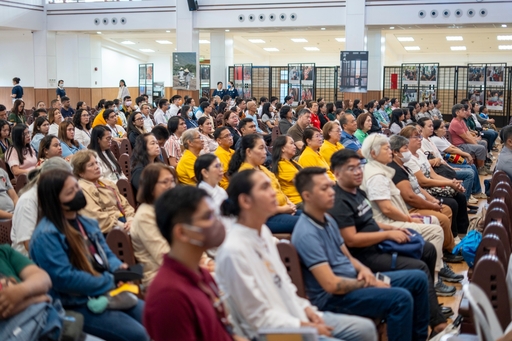 Around 200 attendees participate in the talk, titled “Journey towards a climate of healing and hope: An environment forum for a healthier planet”.
Around 200 attendees participate in the talk, titled “Journey towards a climate of healing and hope: An environment forum for a healthier planet”.
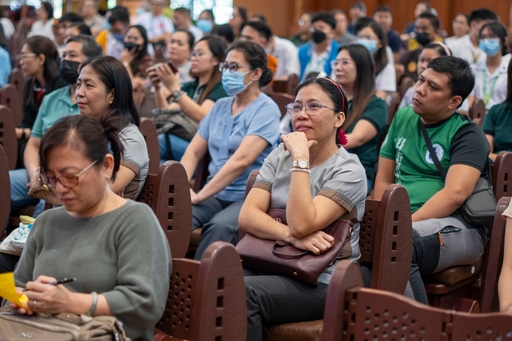 Amelie Erivera (in gray, holding a maroon bag) smiles as she listens to the speakers.
Amelie Erivera (in gray, holding a maroon bag) smiles as she listens to the speakers.
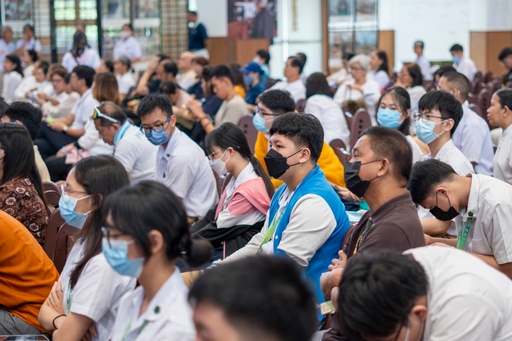 Student and Tzu Chi Youth member Jerry Go (in blue jacket) earnestly listens to the insights shared by the speakers.
Student and Tzu Chi Youth member Jerry Go (in blue jacket) earnestly listens to the insights shared by the speakers.
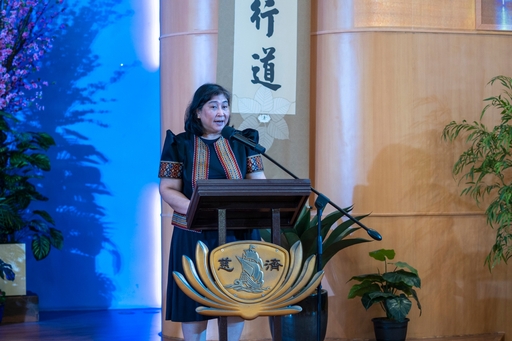 Dr. Esterlita Uy shared insights on how individuals can help save Earth, such as ensuring that our resources do not go to waste.
Dr. Esterlita Uy shared insights on how individuals can help save Earth, such as ensuring that our resources do not go to waste.
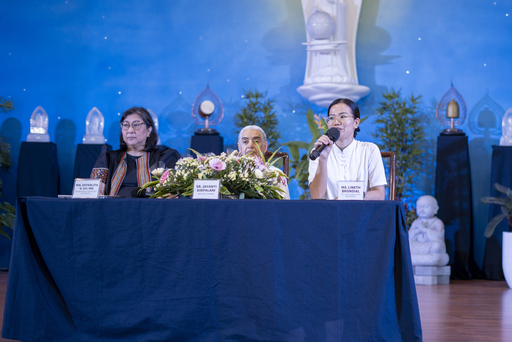 “We can think about climate action as a personal action. What we can do is start within ourselves. The most practical thing that we can do is to change our habits, starting with the food that we eat," says Lineth Brondial.
“We can think about climate action as a personal action. What we can do is start within ourselves. The most practical thing that we can do is to change our habits, starting with the food that we eat," says Lineth Brondial.
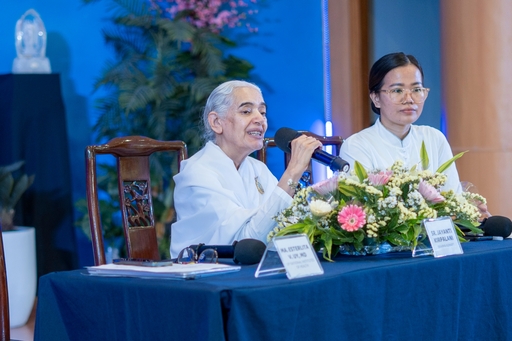 During her talk, BK Sr. Jayanti Kirpalani discussed consumerism and how this affects our environment and resources. “Human beings have managed with their high intelligence to actually destroy our own home, this very precious planet,” she expressed.
During her talk, BK Sr. Jayanti Kirpalani discussed consumerism and how this affects our environment and resources. “Human beings have managed with their high intelligence to actually destroy our own home, this very precious planet,” she expressed.
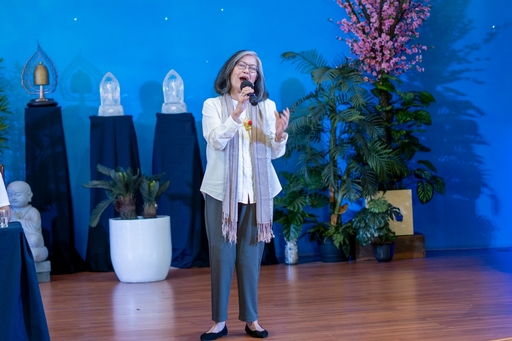 Sr. Tina Diaz of Brahma Kumaris shared her talent with the audience, singing her rendition of the song “God Save the Rainbow”.
Sr. Tina Diaz of Brahma Kumaris shared her talent with the audience, singing her rendition of the song “God Save the Rainbow”.
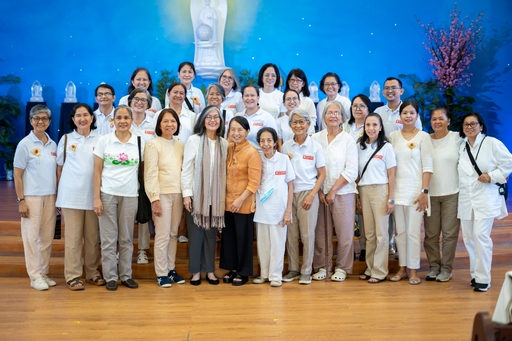 Members of Brahma Kumaris take a happy photo after the successful event.
Members of Brahma Kumaris take a happy photo after the successful event.
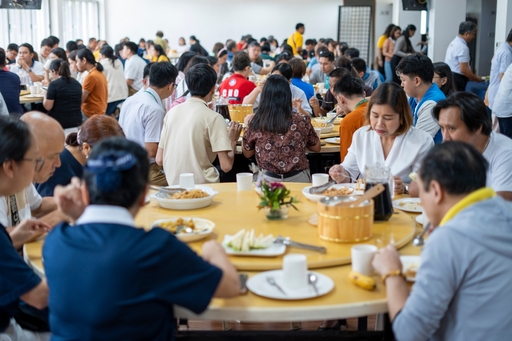 After the event, attendees enjoy a vegetarian lunch prepared by Tzu Chi volunteers.
After the event, attendees enjoy a vegetarian lunch prepared by Tzu Chi volunteers.





